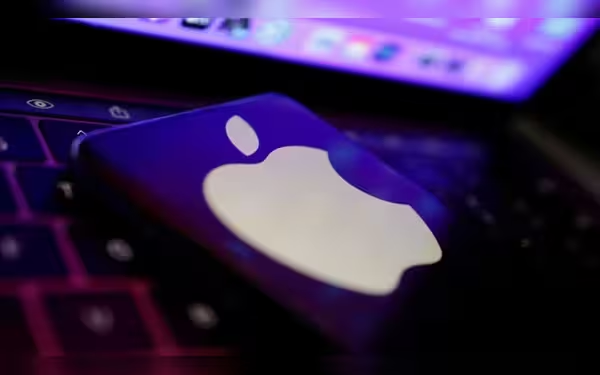Thursday, November 21, 2024 07:19 AM
Apple Seeks Dismissal of US Smartphone Monopoly Case
- Apple requests dismissal of DOJ's antitrust case.
- Claims of user 'lock-in' to Apple's ecosystem.
- Potential implications for competition in tech industry.
 Image Credits: thefrontierpost
Image Credits: thefrontierpostApple aims to dismiss a DOJ case alleging smartphone market monopoly, raising significant competition concerns.
In a significant legal development, Apple is set to request a federal judge to dismiss a case brought against it by the US Department of Justice (DOJ). This case accuses the tech giant of unlawfully dominating the smartphone market, marking yet another chapter in the ongoing scrutiny of Big Tech companies regarding antitrust issues. The hearing is scheduled for Wednesday in Newark, New Jersey, where US District Judge Julien Neals will listen to arguments from both Apple’s legal team and the prosecutors.
The DOJ claims that Apple has created a situation where users are 'locked in' to its ecosystem, making it difficult for competitors to thrive. This is primarily due to Apple's restrictions on interoperability between the iPhone and third-party applications and devices. In simpler terms, Apple is accused of making it hard for other companies to create products that work well with the iPhone, which could limit choices for consumers.
Apple, on the other hand, argues that its limitations on developers' access to its technology are reasonable. The company believes that if it were forced to share its technology with competitors, it could stifle innovation. This argument is part of a broader narrative that many Big Tech firms are using as they face increasing scrutiny from regulators.
The case against Apple has a political backdrop, having started during Donald Trump’s presidency and continuing under President Joe Biden’s administration. This bipartisan approach to antitrust cases against major technology firms indicates a growing concern among lawmakers about the power these companies hold in the market.
Interestingly, similar antitrust claims have faced challenges in the past. For instance, a judge dismissed a case from the Federal Trade Commission against Meta, the parent company of Facebook, regarding its restrictions on third-party app developers. Additionally, in a separate case involving Google, a judge ruled that the company did not need to accommodate advertisers on Microsoft’s Bing search engine more than it already does. Apple has pointed to these rulings, suggesting that limiting access to technology should not automatically be viewed as anti-competitive behavior.
The lawsuit filed by the DOJ and a coalition of states in March aims to address various restrictions and fees imposed on app developers, as well as technical barriers that prevent third-party devices and services from competing with Apple’s own offerings. These include smartwatches, digital wallets, and messaging services.
If Judge Neals finds the claims against Apple plausible, the case will proceed, potentially leading to significant changes in how Apple operates within the smartphone market. This situation raises important questions about competition, consumer choice, and the future of innovation in technology.
As the legal battle unfolds, it will be crucial for consumers and industry observers to pay attention. The outcome could not only impact Apple but also set a precedent for how other tech companies operate in a rapidly evolving digital landscape. The implications of this case extend beyond just one company; they could reshape the entire tech industry and influence how consumers interact with technology in their daily lives.













